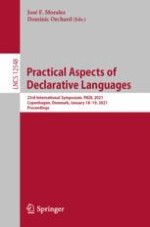This book constitutes the refereed proceedings of the 23rd International Symposium on Practical Aspects of Declarative Languages, PADL 2021, held in Copenhagen, Denmark, in January 2021.
The 10 full papers were carefully reviewed and selected from 21 submissions. The papers present original work emphasizing novel applications and implementation techniques for all forms of declarative concepts, including programming with sets, functions, logic, and constraints. The papers are organized in the following topical headings:
Foundations and Programming Concepts; Applications of Declarative Languages, and Declarative Approaches to Testing and Debugging.
Due to the Corona pandemic PADL 2021 was held as a virtual event.
